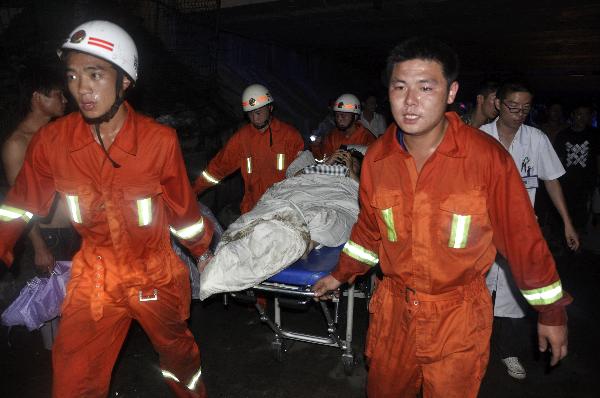Death toll up to 35 in train crash
 0 Comment(s)
0 Comment(s) Print
Print E-mail
Xinhua, July 24, 2011
E-mail
Xinhua, July 24, 2011
|
Rescuers carry an injured man from a damaged coach that veered off a road and overturned in Suoqian Town, Xiaoshan of Hangzhou, capital of east China's Zhejiang Province, July 23, 2011. [Xinhua] |
Public worries
The public expressed their worries online over the operation of high-speed trains after the fatal incident. Many said they would not choose to take bullet trains.
A netizen called Su Yan doubted the safety of high-speed trains at the website of Wujin News.
"Who dares to take bullet trains or high-speed trains?" Su Yan said. "The operational safety of China's railways is seriously challenged, and it'll be a long and tough process to earn customers' trust again."
"China should not only learn technologies but also management," said Ma Xiaolin, a well-known public commentator.
Cai Chengping, director of the Tokyo-based Asia-Pacific Political and Economic Research Center, said at his microblog at weibo.com that Japan had suffered similar train derailing, but the safety condition improved a lot afterwards.
"China should learn from Japan on dealing with accidents," he said.
Actually, problems with China's fledgling high-speed railway have been in the spotlight in the past weeks after the Beijing-Shanghai high-speed railway started operation on June 30. Trains on the route have been delayed for at least three times because of power failure or lightning factors.
For more information of the dead and injured foreigners, please contact the Department of Foreign Affairs of People's Government of Zhejiang Province:
Tel: +86-571-87050300
Fax: +86-571-85156432
Address: 25 Santaishan Road, Hangzhou, Zhejiang, China, 310007
Department of International Cooperation, Ministry of Railway
Tel: +86-10-51842855 +86-10-51841855
Address: 10 Fuxing Road, Beijing, China, 100844






